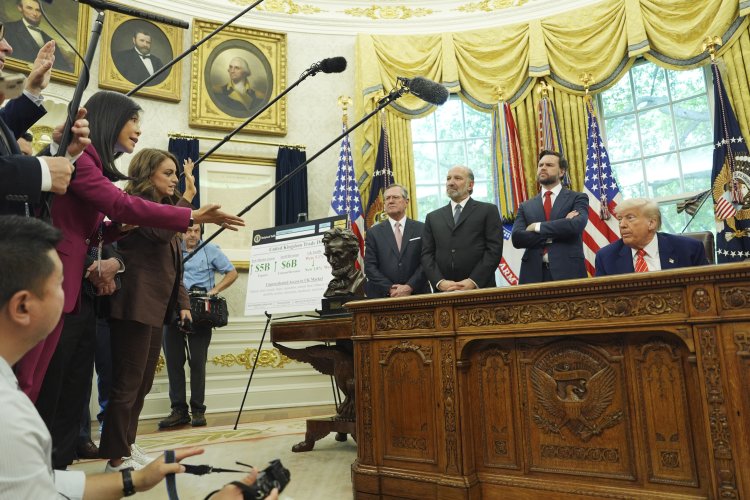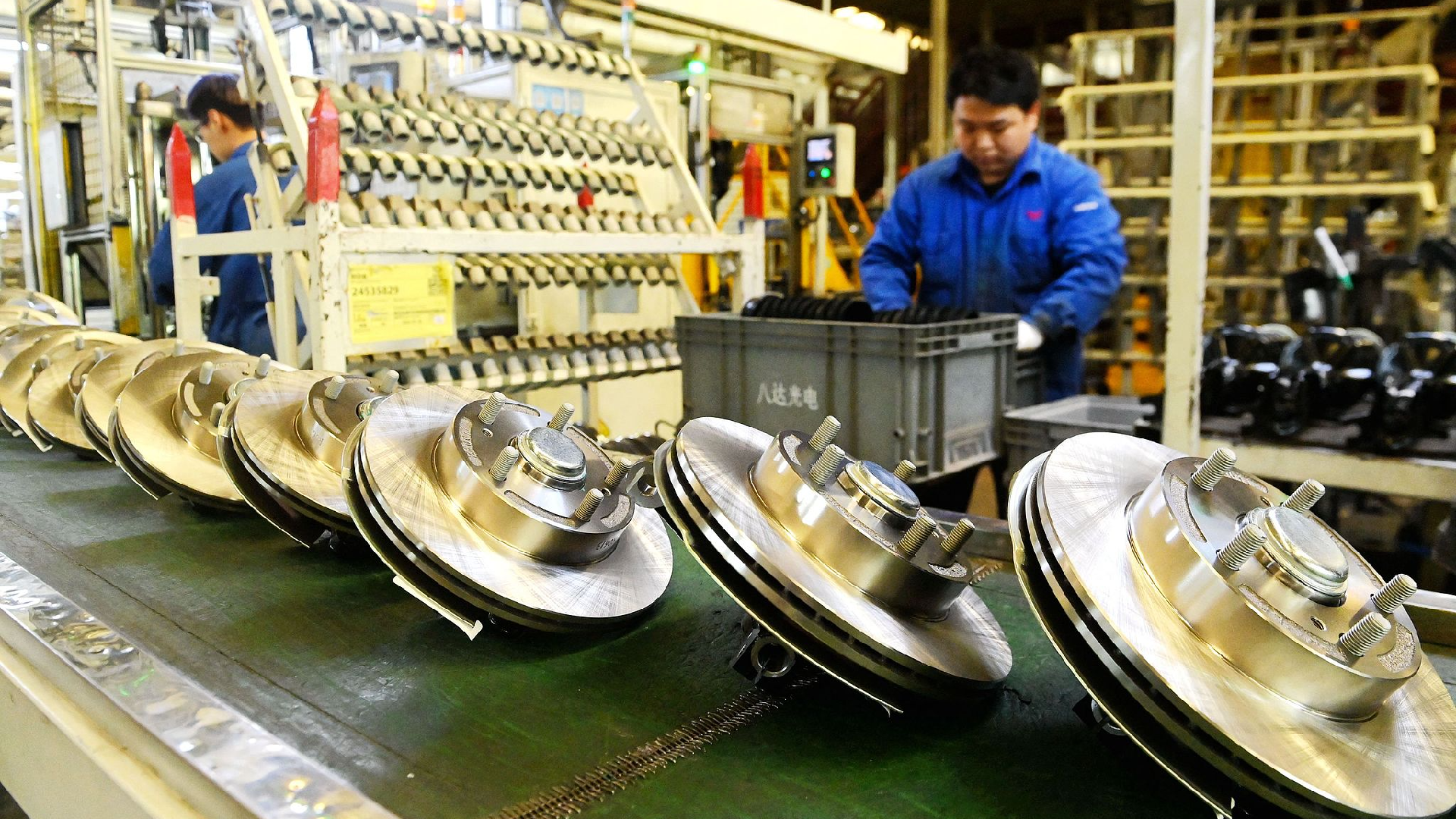'Lot of other countries in the queue': UK's trade agreement marks an initial phase in an extensive journey
The UK pact serves as a framework aimed at facilitating trade in particular sectors, along with a commitment to develop additional details at a later date.

The agreement announced in the Oval Office, with Prime Minister Keir Starmer joining via speakerphone and many of Trump’s top aides present, does not constitute a traditional trade agreement. Instead, it serves as a framework targeting specific sectors of trade, with a promise to finalize additional details later.
Despite the president's upbeat tone, the road ahead remains complex. The U.S. is still engaged in negotiations with numerous countries affected by heavy tariffs, and Treasury Secretary Scott Bessent is scheduled to meet in Switzerland this weekend to address escalating tensions with China, the world’s second-largest economy and the U.S.’s third-largest trading partner.
Everett Eissenstat, a former deputy director of the National Economic Council in Trump’s initial term, remarked that the agreement represents a “very significant development” indicative of where the administration is willing to make concessions. However, he cautioned that “negotiating durable trade agreements takes time” and noted the numerous other countries awaiting negotiations.
The framework established between the U.S. and the U.K. includes plans for the U.S. to export $5 billion in specific products, including ethanol, beef, machinery, and other agricultural goods. A 10 percent tariff on all U.K. imports will continue, with expectations that it will raise $6 billion. Conversely, the U.K. will be allowed to export 100,000 cars to the U.S. at this lower tariff rate instead of the current 25 percent for autos, and the U.S. will eliminate tariffs on steel.
However, the agreement does not tackle the U.K.'s 2 percent digital services tax imposed on U.S. tech companies for services such as online advertising, an issue Trump officials wanted to address. It also leaves unresolved tariffs on other goods, such as pharmaceuticals and the 100 percent levies Trump had threatened on foreign films.
In the Oval Office, Trump dismissed suggestions that the deal was anything less than comprehensive while indicating potential for expansion. “This is a very conclusive deal but we think we can grow it even from that,” he stated. “This is a maxed-out deal that we’re going to make bigger and we make it bigger through growth.”
Agriculture Secretary Brooke Rollins, speaking on Fox Business on the same day, seemed to contrast Trump’s assertion. She described the announcement as “a very, very important step” but admitted it was “an agreement in concept. There are a lot of details to be worked out.”
The timeline of negotiations was notably tight; Trump reportedly made what U.K. Ambassador to the U.S. Peter Mandelson described as an “11th-hour intervention.” The president called Starmer at around 9 p.m. London time on Thursday to request the U.K. lower tariffs on American ethanol and pork. The U.K. acquiesced regarding ethanol but declined to adjust tariffs on pork.
The White House has been looking for ways to ease economic tensions, identifying the U.K. deal as a potential tool to mitigate such unease. While Trump’s allies and former administration officials view this agreement as a positive starting point, it is unlikely to alleviate broader economic uncertainties in the U.S., particularly given the challenges of empty ports along the West Coast and heightened consumer anxiety.
The U.K. accounts for a mere fraction of U.S. trade, with two-way trade amounting to approximately $148 billion last year, or about 3 percent of total U.S. trade globally. This pales in comparison to relationships with other trading partners like China, which face much steeper tariffs.
Eager for a win before his Middle East trip, Trump’s agreement with the U.K. hints at a possible pattern for forthcoming trade arrangements with other nations such as India, Japan, and South Korea. These proposed deals are also expected to lack the robustness of comprehensive trade agreements, serving primarily as initial frameworks for further discussions.
The U.K. deal was reached relatively quickly compared to negotiations with other nations. The two countries had been in discussion prior to Trump’s April “Liberation Day” tariffs, with the U.K. seeking a trade agreement since Trump’s first term in office as it aimed to pivot away from European reliance amidst Brexit preparations.
Republican allies have taken a cautious approach, with Sen. Thom Tillis emphasizing the complexities introduced by ongoing negotiations. “It would have been a bit easier to prosecute this had we not had so many traditional, generally speaking, trading partners in the yellow, not necessarily in the green, that we’re dealing with at the same time,” Tillis remarked, highlighting the added complexity for Bessent.
Trade deals are anticipated to progress in stages: the administration will start by asking for a terms sheet outlining negotiable areas, followed by developing a preliminary outline of a deal that serves as a letter of intent. The subsequent detailed negotiations will require significant legal work, which could ultimately determine the agreement's success.
In a recent visit to India, Vice President JD Vance revealed that the U.S. had achieved the first stage in negotiations, termed as “terms of reference.” A preliminary announcement of an agreement is expected “within weeks,” while a comprehensive trade deal could take “months,” according to an anonymous source familiar with the discussions.
India is reportedly contemplating the opening of its market to two or three U.S. agricultural imports, potentially including corn for ethanol and another commodity for animal feed.
On the European front, Sabine Weyand, the European Commission’s chief trade official, led discussions with U.S. counterparts the previous Tuesday and Wednesday, and the commission has suggested retaliatory tariffs targeting nearly €100 billion in U.S. imports. An EU official, who spoke anonymously, indicated that progress in negotiations remains limited. “Because the U.S. keeps seemingly changing their focus many times — it is absurd.”
One European participant in the Munich Leaders Meeting compared U.S. negotiation tactics to a decaying animal, suggesting that “they've thrown on the table the stinking fish, and then they've said, ‘What do you pay me … to take that fish away? Oh, but by the way, I will just take away the head. I will leave the rest.’ So only part of the tariffs are negotiable; that is not really conducive to a constructive negotiation.”
When asked for a comment, the White House pointed to Trump’s statements in the Oval Office about negotiating a deal with the European Union but did not respond to inquiries regarding the negative characterization of U.S. negotiation strategies.
A Gallup poll released last week indicated widespread skepticism among Americans about tariffs, with 89 percent believing they will increase prices on consumer products. While 70 percent expect tariffs to cost the U.S. more than they generate in the short run, 62 percent foresee them as a losing proposition in the long term.
Despite this, Trump continues to encourage Americans to endure the costs of tariffs, assuring them of long-term benefits and suggesting they may need to accept fewer holiday gifts. Senate Republicans have been keen for the administration to announce deals as they arise, even if they are merely frameworks for deeper negotiations, to help allay economic concerns.
Bessent informed Congress earlier this week that he anticipates trade agreements with 80 to 90 percent of U.S. trading partners will be established by year’s end. Sen. Bill Hagerty emphasized the urgency of progress in trade discussions, noting the psychological impact of media narratives on market sentiment.
Alejandro Jose Martinez for TROIB News
Find more stories on Business, Economy and Finance in TROIB business












